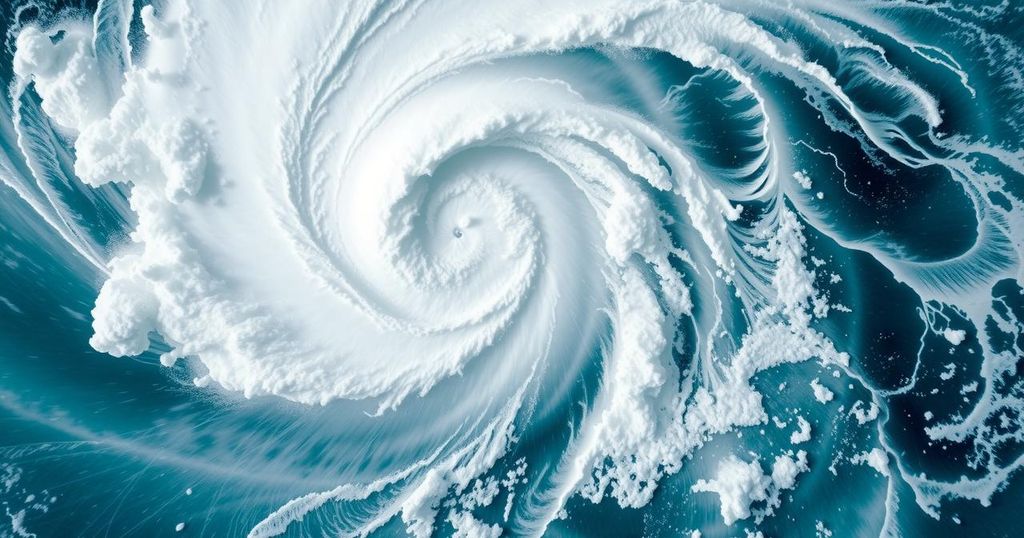World news
AFRICA, CHI, EAGLETON, EMERGENCY RESPONSE, ERATI, FLOODING, HUMANITARIAN AND EMERGENCY OPERATIONS CENTRE, ILHA DE IBO, LOUISE EAGLETON, MARY -, MARY - LOUISE EAGLETON, MONAPO, MONGICUAL, MOZAMBIQUE, NATURAL DISASTER, NATURAL DISASTERS, PEMBA, SADC, SHOC, SOUTHERN AFRICAN DEVELOPMENT COMMUNITY, UNICEF
David O'Sullivan
0 Comments
Cyclone Chido Hits Mozambique: Destructive Winds and Humanitarian Response
Tropical Cyclone Chido struck northern Mozambique on December 15 as a category 4 cyclone, bringing winds of 260 km/h and heavy rainfall, affecting Cabo Delgado and Nampula provinces. Immediate reports indicate damage to infrastructure, prompting humanitarian efforts led by UNICEF. The cyclone is expected to impact southern Malawi before dissipating near Zimbabwe.
On Sunday, December 15, Tropical Cyclone Chido made landfall in Mozambique as a category 4 cyclone, approximately 35-40 kilometers south of Pemba city, in Cabo Delgado Province. This powerful storm generated destructive winds of up to 260 kilometers per hour, produced heavy rainfall totaling 250 millimeters within a 24-hour period, and created perilous sea conditions, increasing the risk of coastal flooding. The most significantly affected regions included Cabo Delgado and Nampula provinces, with reports of infrastructure damage and communication disruptions soon after Chido’s arrival.
The cyclone prompted immediate action from the Humanitarian and Emergency Operations Centre (SHOC) of the Southern African Development Community (SADC), which cautioned that high winds could lead to extensive damage to buildings, uprooting of trees, and threats to essential utilities, including power lines. Additional provinces, such as Niassa, Tete, and Zambezia, were warned to prepare for subsequent impact. In Pemba, while mobile networks went down, electricity remained operational in specific areas, aiding local response efforts.
Mary-Louise Eagleton, UNICEF Mozambique Representative, indicated ongoing assessments of the disaster’s effects in Cabo Delgado, focusing on the urgent needs of affected families and children. “Unicef will be delivering lifesaving medicines, water purification supplies, and other essentials to keep people safe and healthy. Many homes, schools, and health facilities have been partially or completely destroyed, and we are working closely with Government to ensure continuity of essential basic services. While we are doing everything we can, additional support is urgently needed to respond to the urgent needs of those impacted by the cyclone,” Eagleton stated.
Cyclone Chido’s remnants are expected to influence southern Malawi between December 15 and 16, bringing expected heavy rainfall of approximately 100 millimeters and winds between 80 to 100 kilometers per hour. Following this period, the storm system is predicted to dissipate near Zimbabwe by December 17. Prior to reaching Mozambique, Chido passed near the southern regions of the Comoros islands, where preliminary reports on Anjouan indicated minor injuries and displacements due to flooding, while Moheli experienced crop damage only.
Tropical cyclones, such as Cyclone Chido, are significant weather events characterized by intense winds and heavy rainfall, often leading to catastrophic impacts on affected regions. Mozambique, located in the Southern African region, is particularly vulnerable to such storms due to its geographic location along the Indian Ocean. The recent landfall of Cyclone Chido has highlighted the resilience of local communities and the critical need for humanitarian assistance in the aftermath of such disasters, reinforcing the importance of preventative measures to mitigate future cyclone-related damage.
In summary, Cyclone Chido’s devastation in Mozambique underscores the severity of tropical cyclones and their widespread impacts on infrastructure and communities. The urgent need for humanitarian response is emphasized by the challenges faced by local governments and international organizations, notably UNICEF, as they work diligently to address the immediate needs and restore essential services. As this situation unfolds, continuous monitoring and support will be critical for the affected populations throughout the region.
Original Source: allafrica.com




Post Comment